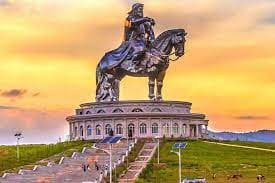Genghis Khan: Shaping the Modern World

Introduction
The name Genghis Khan comes up many think of a fearsome conqueror, an architect of empires who forged an unparalleled legacy in history. However, the impact of Genghis Khan extends far beyond the conquests and battles that marked his era. His influence has resonated through the centuries, leaving an indelible mark on the modern world. Examining Genghis Khan’s historical footprint reveals a complex web of cultural, economic, and geopolitical transformations that have shaped our contemporary global landscape.
Cultural Exchange and the Silk Road
Genghis Khan’s legacy is deeply intertwined with the Silk Road, the ancient network of trade routes connecting the East and West. His empire, stretching from the Pacific Ocean to the Mediterranean Sea, facilitated unprecedented cultural exchange. The Silk Road became a conduit for the flow of goods, ideas, and technologies, contributing to the development of a more interconnected and culturally diverse world.
Genghis Khan played a pivotal role in fostering this cultural exchange. The Mongol Empire, under his leadership, promoted a climate of openness, where people from different regions and backgrounds could interact and share their unique contributions. This cultural diffusion laid the groundwork for the vibrant tapestry of diversity that characterizes the modern world.
Diplomacy and Geopolitical Foundations
Genghis Khan’s impact on the modern world is also evident in the realm of diplomacy and geopolitical structures. A resource from diplomacy.edu emphasizes the strategic genius of Genghis Khan in establishing a diplomatic framework that transcended traditional tribal boundaries. His ability to unite disparate Mongol tribes under a common cause laid the foundation for a centralized administration that prioritized meritocracy and loyalty. These principles influenced subsequent empires and states, shaping the way nations are governed today.
Moreover, the diplomatic strategies employed by Genghis Khan have enduring lessons for contemporary leaders. His emphasis on forging alliances, understanding diverse cultures, and implementing a legal code set a precedent for statecraft that resonates in modern diplomatic practices. Genghis Khan’s geopolitical vision was not merely about conquest but about creating a stable and just empire – a vision that has influenced the trajectory of nation-states throughout history.
Economic Impact and Global Trade
The impact of Genghis Khan on the modern world is also evident in the economic sphere. The Silk Road was not only a cultural conduit but a vital trade route that facilitated the exchange of goods and commodities. Genghis Khan’s policies fostered an environment conducive to trade and economic growth. His administration promoted commerce, and the establishment of a unified currency contributed to the flourishing of economic activities within the empire.
Genghis Khan’s legacy in global trade is mirrored in the modern interconnected economy. The principles of open markets, cross-cultural trade, and the facilitation of economic activities across vast territories, established during his reign, echo in the contemporary globalized marketplace. Genghis Khan’s impact on economic systems transcends time, laying the groundwork for the interconnected world we navigate today.
Technological Advancements and Innovation
Genghis Khan’s influence on the modern world extends to technological advancements and innovation. The Mongol Empire became a melting pot of technological knowledge from East and West. The exchange of technologies, from military innovations to agricultural practices, contributed to advancements that had a lasting impact on the trajectory of human development.
The Mongol Empire’s adoption of advanced technologies and the assimilation of knowledge from various cultures facilitated a cross-fertilization of ideas. This exchange of technological know-how, a hallmark of Genghis Khan’s era, mirrors the collaborative nature of innovation in the modern world. The cross-cultural pollination initiated by Genghis Khan set the stage for a continuous process of technological evolution that continues to define our contemporary era.
Conclusion
In conclusion, the impact of Genghis Khan on the modern world is profound and multi-faceted. His legacy, influenced cultural exchange, diplomacy, global trade, and technological innovation, serves as a testament to the enduring influence of a visionary leader. Genghis Khan’s imprint on the Silk Road, his diplomatic strategies, economic policies, and embrace of technological advancements have collectively shaped the contours of the interconnected and diverse world we inhabit today.
Thank you for reading! Please fill out my follow form below to subscribe to my email list to never miss a blog.
https://thecourageouseffort.com/follow-me/
